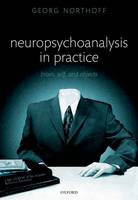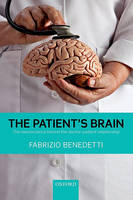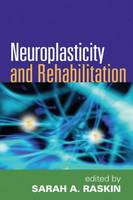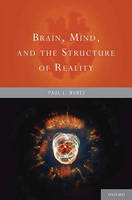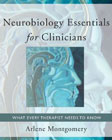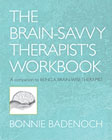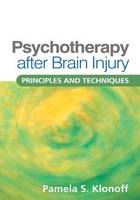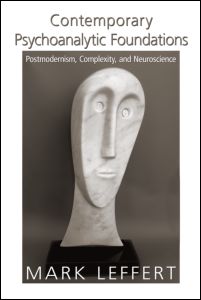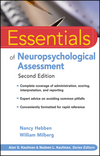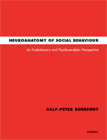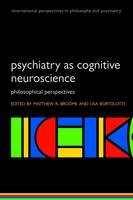Neuroscience Books
Neuropsychoanalysis in Practice: Brain, Self and Objects
Is the Ego nothing but our brain? Are our mental and psychological states nothing but neuronal states of our brain? Though Sigmund Freud rejected a neuroscientific foundation for psychoanalysis,... (more)
The Patient's Brain: The Neuroscience Behind the Doctor-patient Relationship
Due to advances within neuroscience, we are now in a much better position to be able to describe and discuss the biological mechanisms that underlie the doctor-patient relationship. Using this... (more)
Social Neuroscience: Toward Understanding the Underpinnings of the Social Mind
The field of social cognitive neuroscience has captured the attention of many researchers during the past ten years. Much of the impetus for this new field came from the development of functional... (more)
Psychotherapy for Neuropsychological Challenges
This book is a unique and timely addition to the literature for it provides approaches for dealing with the cognitive and emotional consequences of common neurological diseases. There is growing... (more)
Neuroplasticity and Rehabilitation
Brain plasticity is the focus of a growing body of research with significant implications for neurorehabilitation. This state-of-the-art volume explores ways in which brain-injured individuals may be... (more)
Brain, Mind, and the Structure of Reality
Does the brain create the mind, or is some external entity involved? In addressing this hard problem of consciousness, we face a central human challenge: what do we really know and how do we know it?... (more)
The Polyvagal Theory: Neurophysiological Foundatons of Emotions, Attachment, Communication, and Self-Regulation
This book compiles, for the first time, Stephen W. Porges's research. The world's leading expert on the autonomic nervous system, Porges is the mind behind the groundbreaking Polyvagal Theory, which... (more)
Neurobiology Essentials for Clinicians: What Every Therapist Needs to Know
A primer on brain functionality as it relates to therapeutic work.
This book presents an overview of the latest theories of affect regulation and focuses on how these theories work in clinical... (more)
The Brain-Savvy Therapists Workbook: A Companion to Being a Brain-Wise Therapist
Chock-full of exercises and strategies, this book will allow clients to deepen the key principles of interpersonal neurobiology that Bonnie Badenoch wrote about in her earlier book. Topics include... (more)
Practical Neuropsychological Rehabilitation in Acquired Brain Injury: A Guide for Working Clinicians
The book aims to acknowledge the complexity of working with clients who have an acquired brain injury but also seeks to give the interested reader practical and useable guides to develop their... (more)
Psychotherapy After Brain Injury: Principles and Techniques
This book presents hands-on tools for addressing the multiple ways that brain injury can affect psychological functioning and well-being. (more)
Psyche and Brain: The Biology of Talking Cures
'There is a sea change afoot in contemporary psychoanalysis and this brilliant volume is a manifesto of it. When brain science and clinical psychoanalysis are put on exactly equal conceptual footing... (more)
Mapping the Mind
Brain scans reveal our thoughts, memories - even our moods - as clearly as an X-ray reveals our bones. We can watch a person's brain literally light up as it registers a joke, or glow dully when it... (more)
Biofeedback for the Brain: How Neurotherapy Effectively Treats Depression, ADHD, Autism, and More
"Neurofeedback" is a cutting-edge, drug-free therapeutic technique used by over a thousand licensed therapists in North America to treat a range of conditions from attention deficit and hyperactivity... (more)
Contemporary Psychoanalytic Foundations: Postmodernism, Complexity, and Neuroscience
Past scholars have tried to classify psychoanalysis as an intrinsically positivist science, with varying degrees of success. Their critics have fared little better with narrow applications of... (more)
Cognitive Neuroscience of Aging: Linking Cognitive and Cerebral Aging
Until very recently, our knowledge about the neural basis of cognitive aging was based on two disciplines that had very little contact with each other. Whereas the neuroscience of aging investigated... (more)
A Basic Theory of Neuropsychoanalysis
This book introduces a theoretical framework for studying the mind. Specifically, an attempt is made to frame ideas from psychoanalysis and cognitive-social psychology so that they can be taken... (more)
Love and War in Intimate Relationships: Connection, Disconnection, and Mutual Regulation in Couple Therapy
Neuroscience and couples therapy come together to help couples break patterns of bad behavior. What happens between partners that makes love turn to war? How can couples therapists help de-escalate... (more)
What Freud Didn't Know: A Three-step Practice for Emotional Well-being Through Neuroscience and Psychology
In a thoughtful and down-to-earth way, Timothy B. Stokes overturns old formulas - and many Freudian concepts - for achieving personal change. During one's lifetime, hidden memories, along with their... (more)
The Behavioral Neuroscience of Adolescence
Recent research confirms that the brain undergoes major development during adolescence. This book reviews the neuroscience of the adolescent brain and how this knowledge is revolutionising our... (more)
The Dao of Neuroscience: Combining Eastern and Western Principles for Optimal Therapeutic Change
Neuroscientists have made huge advances in our understanding of the brain, and yet as scientists learn more, paradoxes arise. How does the braina material substancerelate to and produce nonmaterial... (more)
Essentials of Neuropsychological Assessment: Second Edition
Now in an updated edition, "Essentials of Neuropsychological Assessment, Second Edition" remains the best source for practical, step-by-step instruction on accurately and effectively administering,... (more)
Confabulation: Views from Neuroscience, Psychiatry, Psychology and Philosophy
When people confabulate, they make a false claim that they honestly believe is true. The book contains countless fascinating examples of confabulatory behaviour - people falsely recalling events from... (more)
Presence of Mind in Neurophysiological Processes
This book is a study of the simultaneous physiological recordings and psychoanalytic observations when emotional/psychological responses to external stimuli occur pari passu with observed... (more)
Neuroanatomy of Social Behaviour: An Evolutionary and Psychoanalytic Perspective
This book is for readers who are knowledgeable about the neurosciences and curious about brain mechanisms that produce normal and pathological social behaviour. It is a reference work that presents... (more)
Forensic Neuropsychology in Practice: A Guide to Assessment and Legal Processes
Clinical psychologists and psychiatrists are increasingly being asked to prepare reports for legal purposes. These might involve issues regarding the clients own mental state at the time they... (more)
Memory Rehabilitation
From a well-known authority, this comprehensive yet accessible book shows how state-of-the-art research can be applied to help people with nonprogressive memory disorders improve their functioning... (more)
Principles of Memory
In over 100 years of scientific research on human memory, and nearly 50 years after the so-called cognitive revolution, we have nothing that really constitutes a widely accepted and frequently cited... (more)
Reading Minds: A Guide to the Cognitive Neuroscience Revolution
Reading Minds is a practical guide to the cognitive science revolution. With fascinating descriptions of studies of the mind, from the brain scans of lovers and liars in London to the eye movements... (more)
Psychiatry as Cognitive Neuroscience: Philosophical Perspectives
"Psychiatry as Cognitive Neuroscience" is a philosophical analysis of the role of neuroscience in the study of psychopathology. The book examines numerous cognitive neuroscientific methods, such as... (more)


